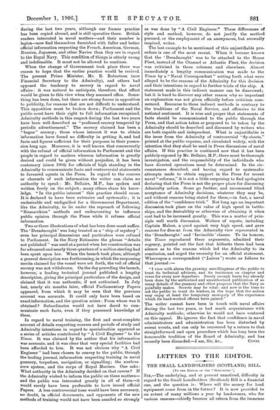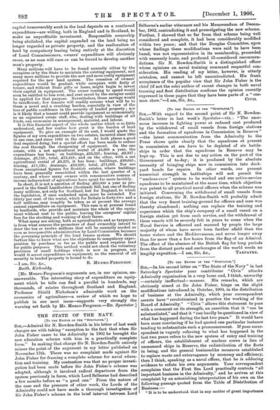LETTE RS TO THE EDITO R.
THE SMALL LANDHOLDERS (SCOTLAND) BILL.
[TO THZ EDITOR Of THY "SCRCTATOR...j
SIB,—The underlying, and at present unnoticed, difficulty in regard to the Small Landholders (Scotland) Bill is a financial one, and the question is : Where will the money for land equipment come from in the future ? It is now provided to an extent of many millions a year by landowners, who for various reasons—chiefly because all return from the immense capital irrecoverably sunk in the land depends on a continued expenditure—are willing, both in England and in Scotland, to make an unprofitable investment. Responsible ownership being abolished, the capital expended on the land being no longer regarded as private property, and the reallocation of land by compulsory leasing being entirely at the discretion of Land Commissioners, owners' expenditure will obviously cease, as no man will care or can be forced to develop another man's property.
Many millions will have to be found annually either by the occupiers or by the State to maintain the existing equipment, and many more millions to provide the new and more costly equipment required for the new land system. The cessation of owners' expenditure would be gradual, while occupiers with fixity of
tenure, and without State gifts or loans, might begin to invest their capital in equipment. The owner ceasing to spend would soon be entitled to less rent, and rent saved by the occupier could be applied for that purpose. Nevertheless, these savings would be insufficient; few tenants will readily assume what will be to them a novel and a crushing burden, especially in view of the loss of public confidence in the security of landed property ; nor is it likely that a tenant could provide equipment so economically as an organised estate staff, who, dealing with buildings of all kinds, can economise in management, material, and labour. It is this financial aspect of the whole matter which is so little understood, and few realise how great is the burden of land equipment. To give an example of its cost, I would quote the figures of my own expenditure on two estates, incurred since 1880 in one case, and since 1882 in the other. At both places a good deal required doing, but a special effort has been made to reduce the cost through the cheapening of equipment. On the one estate, with a net agricultural rental of £4,995 a year, the expenditure has been : on buildings, £55,325; fencing, £9,337; drainage, £8,756; total, £73,418; and on the other, with a net agricultural rental of £3,225, it has been : buildings, £49,645; fencing, £11,120; drainage, £10,328; total, £71,093. Nor are these exceptional figures for Scottish estates, where buildings have been generally remodelled within the last quarter of a century, and where many owners with remunerative sources of income independent of agriculture have spent far more lavishly.
In short, it is not a question of finding £65,000 a year as pro- posed in the Small Landholders (Scotland) Bill, but one of finding ninny millions, not only for Scotland, but for England, to which the legislation, if once embarked upon, must be extended. For thirty per cent, of the rental, which for Britain is forty-two and a half millions, may roughly be taken as at present the average • annual expenditure on equipment. This sum is at present found by landlords, who provide and maintain the whole of the equip- ment without cost to the public, leaving the occupiers' capital free for the stocking and working of their farms.
What many are asking, both as agriculturists and as taxpayers, is from what sources the promoters of dual ownership intend to • draw the ten or twelve millions that will be annually needed as soon as irresponsible administration by Land Commission becomes the governing principle of the land tenure system. We should further like to know what are the objections to compulsory expro- priation by purchase so far as the public need requires land for public purposes. This method would not check the voluntary provision of small holdings which is now in progress, nor would it arrest expenditure on equipment, as the removal of all security in landed property is bound to do.
Noah, Kirkcaldy.
[Mr. Munro-Ferguson's arguments are, in our opinion, un- answerable. The interesting story of expenditure on equip- ment which he tells can find a parallel in hundreds, nay thousands, of estates throughout Scotland and England. Professor Shield Nicholson's admirable work on the economics of agriculture—a review of which we hope to publish in our next issue—supports very strongly the warning set forth by Mr. Munro-Ferguson.—En. Spectator.]































































 Previous page
Previous page